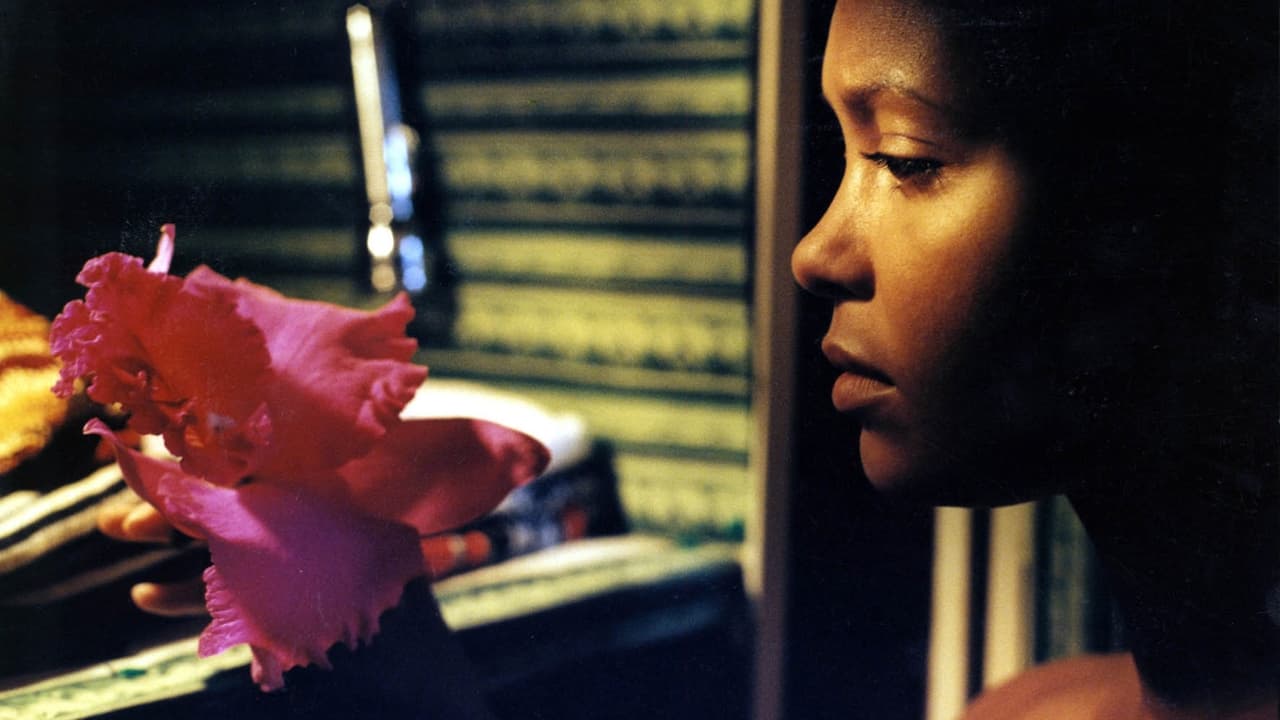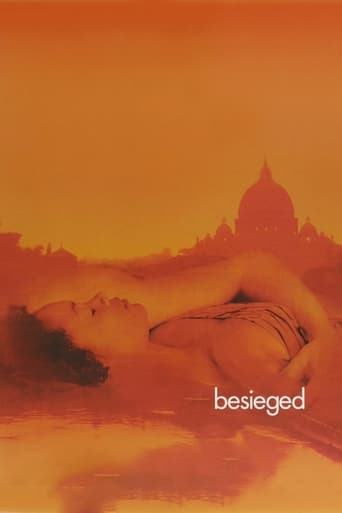

Very few times do I see movies that leave me with no emotion other than boredom. This is one of those few movies. I don't recall seeing any of Berdolucci's earlier work, but he possesses a knack for assembling images. He's definitely a fine visual artist, and I felt some of the sets were beautiful, as well as the music. Unfortunately, the script might as well have been a series of blank pages. I'm sure many will praise the film because of its lack of dialogue, and how artful that is since so many modern films depend too much on dialogue. Well, that may be true, but no dialogue alone doesn't make a movie work. "In the Bedroom" contained long scenes with no dialogue, but the silent images helped tell the story, and the brilliant facial expressions by both Tom Wilkinson and Sissy Spacek gave the audience great insight into how they were feeling. I'm not bashing the actors in this movie, and Thandie Newton and David Thewlis are both genuinely talented, but they're not given much to work with. The story contains very little conflict. At times the love affair between Newton and Thewlis seems to be forgotten, and the whole affair itself contains no passion. You know a movie's awful when it has NO effect on you. It didn't make me angry, it didn't annoy me, it didn't repulse me, it did nothing! And even at 90 minutes, it felt like a miniseries! My score: 2 (out of 10)
... View MoreDuring the first twenty minutes or so of `Besieged,' directed by Bernardo Bertolucci, there is virtually no dialogue, at least nothing even remotely conversational; and yet the first half hour of the film is almost hypnotically riveting, and by that point you already know more about the two main characters than if they'd had pages worth of words to say. And it's all done with the subtle, controlled emoting of the actors, guided by a director with a keen eye for detail, who knows exactly what he wants, how to get it and how to present it. This emotionally involving film stars Thandie Newton as Shandurai, a young woman forced to leave South Africa for Rome after her husband, a school teacher, is arrested by the Military Police, then summarily held in prison-- and without a trial-- indefinitely (His crime is never precisely indicated, though it is implied during a classroom scene at the very beginning of the film). In Rome, Shandurai attends medical school, while supporting herself by working as a housekeeper for a man named Mr. Kinsky (David Thewlis), a reclusive pianist, apparently fairly well-to-do, who gives piano lessons to children in his home. Early on in the film it is evident that Mr. Kinsky looks upon Shandurai as something more than merely a housekeeper; he is obviously quite taken with her. The moral implications of the situation are readily apparent, of course, as is the position in which it will predictably place Shandurai at some point in the near future. There is little doubt as to the direction the story is taking; the question that remains, however, is how Shandurai will deal with her impending dilemma. The story becomes even more engaging as matters are pressed and circumstances develop which make Shandurai's conundrum even more of a moral miasma. Bertolucci draws his audience in by creating a situation so emotionally complex that at times it fairly resonates on the screen. And rather than allowing it to become simply a test of love and loyalty, he takes it much deeper-- so that the real impact of the film stems from the respective stances taken by Shandurai and Mr. Kinsky, as they strive to resolve their personal feelings while attempting to satisfactorily breach this seemingly insurmountable situation. Bertolucci draws a delicate line on which he balances the emotions, actions and reactions of his characters, which pays off handsomely in the end. The overall success of the film, however, is predicated upon on thing-- that being the performances of Newton and Thewlis; and both deliver, unequivocally. Newton's role is especially challenging, as she has to convey so much through her emotions alone. Her gestures, expressions and mannerisms are her words; and the slightest alteration of any of these-- the slightest arch of an eyebrow, a shifting of the eyes at a particular moment or a barely discernible movement of her lips-- speaks volumes. And for this to be effective, it had to come from a place deep within; mere surface theatrics or any hint of pretentiousness at any time would have dispelled the believability of the character at once-- and Newton not only prevails, but does so overwhelmingly. It's an extremely well realized portrayal of a woman in conflict, facing one of the greatest trials of her life. Thewlis, as well, gives a resoundingly sympathetic performance as Mr. Kinsky, that would have to be ranked among the best work he's ever done. As with Newton's role, he must convey so much physically, and he does-- turning in a very sensitive, well defined performance through which he employs just the right amount of reserve and restraint as befits the character he is creating. It's an affecting, honest portrayal that makes Mr. Kinsky very real and believable. The supporting cast includes Claudio Santamaria, John C. Ojwang, Massimo De Rossi, Cyril Nri, Paul Osul and Veronica Lazar. Artistically rendered and subtle in nuance, `Besieged' explores the parameters of love and measures the limits of the boundaries expressed by the heart. An insightful treatise on human nature, it removes one emotional layer after another, right up to the very end-- which is a moment of truth nothing less than sublime. And one that will keep this film in your memory long after the screen has gone dark. I rate this one 8/10.
... View MoreBESIEGED (1998)-- Grade: B+WARNING: YOU MAY FIND SOME SPOILERS AHEADWhat a beautiful film! Only a master as Bertolucci could capture the true essence of that story. It's a simple story of two lost souls, whose lives are like an order of facts, any of them very remarkable. A story of love, mystery, music, past memories... OR NOT? A simple story... OR NOT?It's really difficult to define BESIEGED in words, as much as it's difficult to know what is the centerpiece of other peculiar art-house films (LAST YEAR AT MARIENBAD, for example), but this doesn't take its beauty. It's an artistic film, not very recommended if you are looking for pure entertainment, but a must see if you want to think. The story revolves around the strange relationship between Shandurai, an African refugee whose husband is in jail, and Mr. Kinsky, the pianist for whom she works in Rome, in order to have a place to live and money to pay her medicine school. They seem quite distant from each other and talk very little, but he starts to send her flowers, bottles of champagne, while she suffers with constant nightmares involving her past in Africa and one local inhabitant who sings typical songs. One day Mr. Kinsky says what Shandurai already seems to know: he loves her. From then on, it's better to tell nothing more. For our luck, they don't discuss their relationship as in the American cinema, but things happen, that will make them get closer, even if they don't know that.BESIEGED can be interpreted superficially, but of course this is not the right way. Everyone should take his/her own conclusions. The end is the epitome of everything: what if he didn't do what she thought he did, and that was just an excuse for what follows? The last 5 minutes will make you think and will enchant you. The letter, the "abrupt" conclusion (in a good way)... "Mr. Kinsky, I love you"It's delightful to see how Bertolucci can still have ideas. After a failure with STEALING BEAUTY, a film that had no beauty indeed, he redeems himself with BESIEGED, a small, but wonderful artistic picture. It's a silent film, with few dialogues, not many characters, but beautifully filmed, with a well told, magic, bittersweet story that is not only about love. It's about our inside feelings, the things that we don't know how to express. Or not! As I said, the film has a peculiar mystery. Is Mr. Kinsky selling his paintings and even his piano for the reason we think he is? We think we know, Shandurai thinks she knows, but nobody of us knows for sure. What about her nightmares, the African singer, Mr. Kinsky's picture on a wall in one of her dreams (see that he is already on her mind)?With very effective performances by Thandie Newton and David Thewlis, BESIEGED will not be among classics and masterpieces, but it is a small and peculiar surprise came from the mind of a master as Bertolucci. A wonderful film!Note: I can't understand the one star Roger Ebert gave for BESIEGED. I know he may be the best film critic of the US, but I can't totally trust in a person that gives 3 and 1/2 stars for THE PERFECT STORM.
... View MoreBertolucci's lush photography is mirrored by the velvety performances of the two co-stars. There's nothing fancy here. The lighting, camera angles, and other directorial touches support and do not supplant a simple story of two people whose generosity prompts them to take important actions independently. It is Thandie Newton's movie all the way (for that matter, so was "Flirting" almost ten years ago, and she is grown up now, yet with still that wistful, girlish smile). But David Thewlis is quirky enouhg to be believable. The fairy tale works. Bravo, Bernardo!
... View More